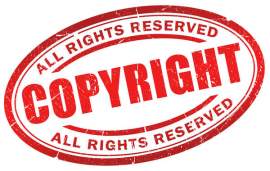
Quick Overview of Copyright Ownership Background

Popular In Copyright
Copyright Law Copyright Infringements What Is Copyright Legal Consequences Of Plagiarism Copyright Free Image Florida Prepaid Postsecondary Education Expense Board V College Savings Bank Famous Cases Of Copyright Law Copyright A Book Library Of Congress Copyright Copyright Laws For Motion Pictures Copyright Infringement Punishment Copyright Symbol
A copyright is a form of protection that is placed on original works created to express ideas. The idea being conveyed must be presented in a tangible medium. Mediums which may be copyrighted are motion pictures, paintings, musical pieces, websites, literary works, photographs![]() , and more. The creator of such works is automatically the original owner of the content the minute that it is finished.
, and more. The creator of such works is automatically the original owner of the content the minute that it is finished.
As an owner of a copyright, that person has the right to use the work in any way he or she wishes. They can sell, alter, and use the created work as they wish without any conflict. They are also given several other options as well to allow other entities to use the work, including for licensing, transferring, and assigning.
Ownership of a copyright does not last forever. The copyrighted work becomes public domain after a certain amount of years after the author's death. When a work becomes public domain, anyone may use it any way they wish. Copyrights can be transferred after a person's death only through the author's will. If a person finds their grandmother's paintings in the attic, he cannot use them if he was not given the rights to do so in the will.
A copyright is considered to be a personal property right. As a result, it is held under State laws and regulations that govern general ownership and property rights through inheritance, transfer![]() and contracts. If you need legal advice and assistance, contact copyright lawyers.
and contracts. If you need legal advice and assistance, contact copyright lawyers.
Copyright ownership transfer![]() is usually done through the use of contracts, usually provided under the confines of the State in which it takes place. The U.S. Copyright Office
is usually done through the use of contracts, usually provided under the confines of the State in which it takes place. The U.S. Copyright Office![]() does not have forms to perform transfers. Transfer of a copyright is not as easy as transferring property of an object. Though one person holds ownership of material, he or she may not be the copyright holder of the material.
does not have forms to perform transfers. Transfer of a copyright is not as easy as transferring property of an object. Though one person holds ownership of material, he or she may not be the copyright holder of the material.


















